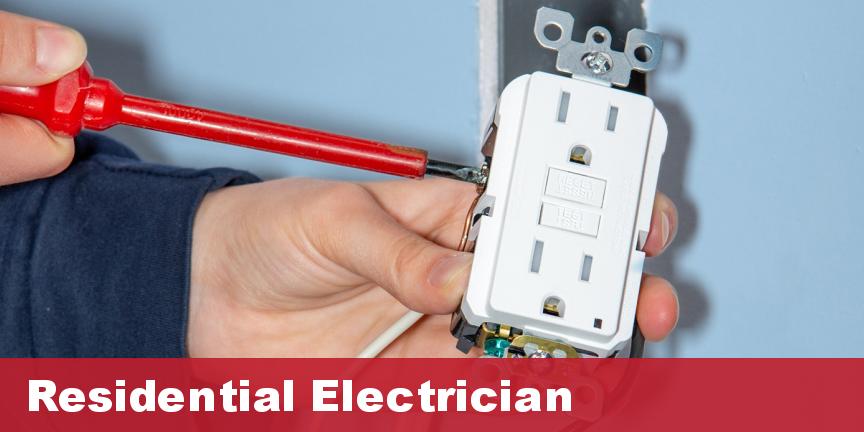Residential Electrician

Online Electrician Training
BECOME A RESIDENTIAL ELECTRICIAN
Electrical work has some of the best opportunities for career stability, especially for residential technicians. If you want to start a career in electrical work, this 100% online electrician course will prepare you for an entry-level residential electrician apprenticeship.
JOB OUTLOOK FOR RESIDENTIAL ELECTRICIANS
- According to the U.S. Bureau of Labor Statistics (BLS), the median annual electrician salary is $60,240, almost $10,000 more than the average of all construction and trade jobs.
- The BLS estimates that jobs for electricians will grow by 6% through 2032, with over 49,200 new jobs.
RESIDENTIAL ELECTRICIAN FAQs
What Is the Difference Between a Residential Electrician and an Electrical Technician?
While residential electricians and electrical technicians both deal with electrical systems, the nature of their work is different. Residential electricians install, maintain, troubleshoot, and repair the wiring in buildings, whether that be residential homes, offices, or commercial properties. On the other hand, electrical technicians work on electrical systems within machinery, specialty equipment and other commonly used devices.
Why are Residential Electricians in Demand?
The biggest reason for job growth in the electrical field is construction. In the U.S., the population will grow by 2 million people per year until 2030, which will mean more construction jobs.
Where are Residential Electricians Needed the Most?
When it comes to construction, electrical workers are the first to install electrical systems. Infrastructure development also comes with new residential and commercial projects. Older buildings need to be retrofitted with technology and alternative energy sources.
Do Residential Electricians Need Licensing?
Licensing in the electrical field differs from state to state. Generally, the licensing process for electricians starts with apprenticeship (2-4 years), journeyman (5-6 years), and master electrician. This residential electrician course will prepare you for an apprentice-level job. Getting your electrician education is the first step to getting licensed.
COURSE OBJECTIVES
- Branch and feeder circuits with various types of cable and conduit
- Service of circuit breakers, lighting fixtures, receptacles, switches, paddle fans, and electric motors
- Identifying and fixing electrical problems on “service calls”
PREREQUISITES AND REQUIREMENTS
There are no prerequisites to take this course.
INSTRUCTORS
Jorge Garcia
Jorge Garcia has over 20 years of experience in the electrical field as both a practicing and electrical instructor. He has been a licensed electrician since 2000 and currently holds an Electrical Contractor and Master Electrician license from Texas. Jorge currently serves as the Department Chair for Construction, Manufacturing, Transportation Technology at Texas Southmost College. Additionally, he has over 15 years in business as an Electrical Contractor for Exit Light Services. Jorge has an associate degree in Electrician Technology, a Bachelor of Science in Criminal Justice, a Master of Science in Management and Leadership, and is currently in a Learning Technology Ph.D. program. He also holds a Fire Suppression License from the State Fire Marshal Office, Licensed Irrigator, Limited License Electrician from Tennessee, License in Bilingual & Technology Education from Texas Education Agency, National Center for Construction Education & Research (NCCER) Electrical Instructor Certification, and an Occupational Safety and Health Administration (OSHA) Authorized Trainer license.
REGISTRATION AND ENROLLMENT
This course is 100% online. Start anytime.

